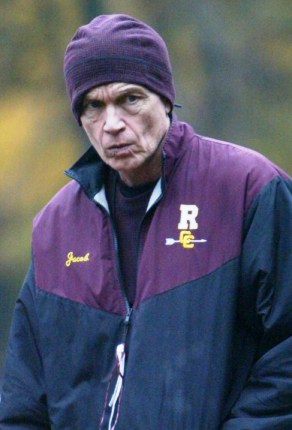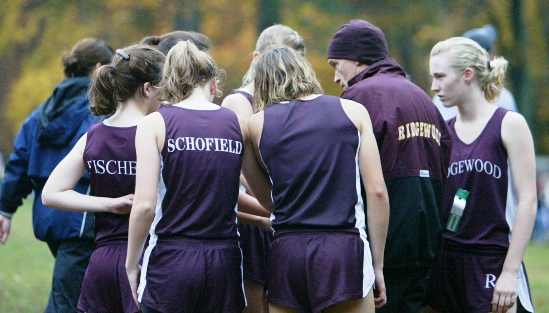 |
 |
 |
|
|
 |
 |
 |


| | Throughout the track and cross-country seasons, the editors of DyeStat.com will choose a Running Warehouse Coach of the Week to recognize coaches around the country for outstanding recent achievements in guiding prep athletes.
| | | jacob brown | ridgewood nj
11.12.09
By John Nepolitan, DyeStat Metro Editor
It is hard for many of today’s athletes to imagine a world where females did not have the same opportunities as their male classmates in sports. Prior to 1972, and the passage of what has become known as “Title IX,” young women were either barred from athletic competition or there were limited chances to take part.
When the rules changed, a number of pioneers led the charge for young women to take their rightful place on the playing field. In northern New Jersey, Jacob Brown (Ridgewood HS) has been the benchmark of not only success, but in how in the promotion of our sports is done. Since girls teams in New Jersey began running sectionals in 1976, only three teams have advanced each and every year – North Hunterdon, Toms River East and Ridgewood. Once again in 2009, the Ridgewood Maroons will be on the starting line in Holmdel Park this weekend.
 Twice, Coach Brown’s squads have gone on to win the New Jersey Meet of Champs and six other times have been in the top 5. At one time, Ridgewood held the national 4x1 mile relay record (20:34.4, 1983) and the school record for 1000 meters (Margaret Scutro, 2:47.44) for many years (1985-2003) was also the National mark. Along the way, Coach Brown started one of the first cross country invitationals, the Ridgewood Invitational, for female runners in New Jersey – which still is being run today. For his efforts and dedication Jacob Brown has been selected as the Running Warehouse Coach of the Week. Twice, Coach Brown’s squads have gone on to win the New Jersey Meet of Champs and six other times have been in the top 5. At one time, Ridgewood held the national 4x1 mile relay record (20:34.4, 1983) and the school record for 1000 meters (Margaret Scutro, 2:47.44) for many years (1985-2003) was also the National mark. Along the way, Coach Brown started one of the first cross country invitationals, the Ridgewood Invitational, for female runners in New Jersey – which still is being run today. For his efforts and dedication Jacob Brown has been selected as the Running Warehouse Coach of the Week.
1) How did you get your start in coaching?
I discovered I really missed track after finishing college. I started volunteering at a local high school (Hershey, Pa.) when I was in medical school. Never finished med school, but discovered I liked coaching.
2) Who were/are your coaching influences?
Every good coach I have met along the way! Harry Groves at Penn State is an important name on the list. Also Ken Doherty’s original book on coaching distance runners had an important influence in the beginning.
3) What is your basic philosophy of coaching and dealing with young people?
Probably the best simple way to answer that is this: I try to adjust to the athletes’ needs. There are many ways to get the job done in cross country and track & field. We work hard and expect devotion to “the run,” but after that I try and adjust to the needs of the athlete.
4) Has either of these philosophies changed over the years and if they have how so?
Not a lot of change. I have allowed family and social needs of the runner to have more influence on my decision making than I did early on.
5) How would you define your training program?
“Don’t hurt them!!” We try and run as much mileage as we can handle, throw in a weekly tempo run, a day of hills, and some grass 100s for form and speed. I believe in weight lifting, stretching and relaxation.
6) Many of today’s female runners and coaches take for granted what they have available to them – that was not always the case. What do you recall about the early years and dealing with the negative stereotypes about young girls and athletics?
This one stopped me for a moment, because if I ever write a memoir this topic will take at least a chapter! The newspapers wouldn’t cover us. At other schools, the boys coaches would not help us with meets. One coach continued his 200 workout during one of our races and yelled at us for using his track! No one paid attention to us except to wish that we weren’t there! One of my most angry memories was how the college boys’ coach treated one of my early champions when she tried to continue running in college!
 7) What do you see are the differences between the runners of today and those from your early years of coaching? 7) What do you see are the differences between the runners of today and those from your early years of coaching?
They dress different and listen to different music! But otherwise, I don’t see lots of differences. Kids are kids, girls are girls, and CC is CC. I see my girls having the same joys and concerns with running that I did 45-50 years ago.
8) What do you see as your biggest impact to northern New Jersey and New Jersey XC as being?
You would have to ask others that! Being a steady, consistent force has been important to me. Hosting some good CC meets has been important to me. The Ridgewood Invite was the first high school girls CC invitational in New Jersey.
9) Has there been one moment or runner that really stands out in your mind in your coaching career?
Coaching Jenna Rogers produced a number of unique and special memories. Our two state meet wins had unique moments. Also two of our BMOC (Bergen Meet of Champs) wins were big upsets. These events and others have created a mental slide show of about 20 events that would be hard to put in a rank order!
10) There will come a day when you will pass on the reins of the Ridgewood girls XC team to another coach. What advice will you give that person?
Don’t let the distractions of Ridgewood/North Jersey/The Big Apple next door keep you from focusing on the team. So many great things to do in this area, so many times it’s hard to keep focus – both for coach and athlete.
Photos by John Nepolitan | |
|
|
|
|
 |
 |